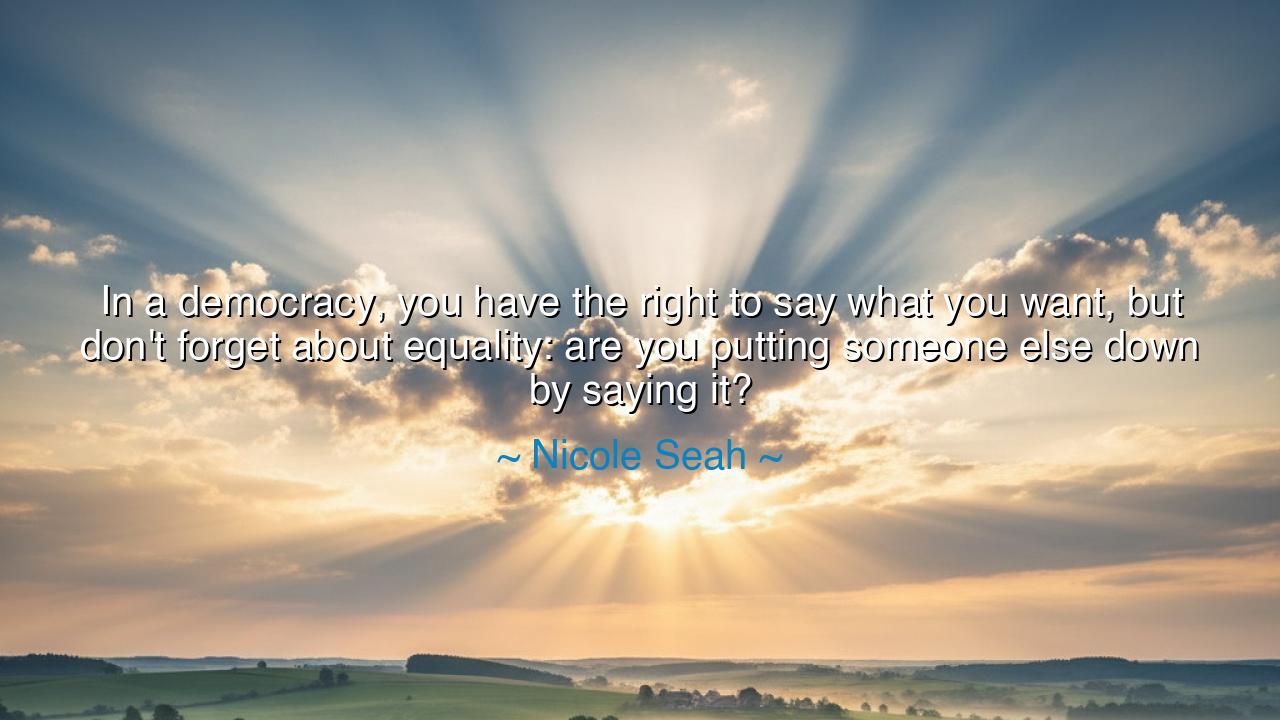
In a democracy, you have the right to say what you want, but
In a democracy, you have the right to say what you want, but don't forget about equality: are you putting someone else down by saying it?






Hear the voice of Nicole Seah, who spoke with wisdom beyond her years: “In a democracy, you have the right to say what you want, but don’t forget about equality: are you putting someone else down by saying it?” In her words, there resounds the eternal struggle between freedom and responsibility, between the liberty of speech and the duty of conscience. Her saying is a lantern for those who walk the path of modern discourse, where the gift of expression can build nations—or burn them. It is a reminder that words, though weightless on the tongue, carry the power to uplift or to destroy, to unite or to divide.
For in every democracy, the voice of the people is the heartbeat of the nation. It is the chorus of many becoming one. But freedom, untempered by wisdom, becomes noise; and equality, unguarded by empathy, fades into illusion. Nicole Seah speaks not against the right to speak, but for the sacred balance that must accompany it—the balance between truth and kindness, between courage and compassion. She asks us not merely to exercise our rights, but to examine our motives: “When you speak, do your words lift humanity higher, or do they press others lower?”
The ancients too understood this power. In the marketplace of Athens, where Socrates once questioned the mighty and the ordinary alike, he taught that speech must be tested by three gates: Is it true? Is it kind? Is it necessary? Those who passed these gates were counted among the wise. But those who spoke to wound or to boast sowed discord, and their cities fell into ruin. In this, Seah’s warning finds ancient echo: that the tongue, though small, can set fire to the forest of peace. To speak freely is a right; to speak wisely is a virtue.
Her words also remind us that equality is not merely a matter of law, but of spirit. When we use our speech to belittle, to mock, or to dehumanize, we violate the very foundation of democracy itself. For democracy stands upon the idea that all voices, however humble, deserve to be heard. If one voice is silenced through scorn, then the harmony of the whole is broken. The greatest danger to freedom does not come from tyranny alone—it comes from the unkindness of the free.
Consider the story of Mahatma Gandhi, who wielded his words as gently as others wielded weapons. Though he lived under an empire that sought to silence him, he never repaid insult with insult, nor hatred with hate. He believed that speech, rightly used, was an instrument of awakening. When asked how he could forgive those who oppressed his people, he said, “I am fighting for their freedom too.” Thus, he showed that true equality is born not from rage, but from reverence for human dignity, even when it is difficult to show.
In this way, Seah’s quote becomes a modern call to ancient wisdom: that speech and respect must walk hand in hand. For to speak is to shape reality. Every word is a stone laid upon the foundation of society—some build bridges, others raise walls. Let each person, before speaking, ask themselves: “Will my words bring light or shadow? Will they create understanding, or will they deepen division?” When equality is forgotten, even the truest words become weapons. But when equality is remembered, even the simplest words can heal.
Let the lesson, then, be carried forward: use your freedom to protect, not to wound. Speak your truth with strength, but temper it with compassion. In every argument, remember the humanity of your opponent; in every victory, remember the humility of your beginnings. For democracy is not sustained by the loudest voice, but by the wisest hearts among its people.
So, children of the future, take these words as a creed: freedom is sacred, but empathy is divine. Speak, but listen. Challenge, but respect. For the mark of a great society is not that all are free to speak, but that all are free to speak without fear of being diminished. And in that sacred balance between freedom and equality, civilization itself endures.






AAdministratorAdministrator
Welcome, honored guests. Please leave a comment, we will respond soon